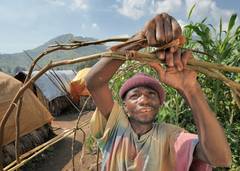International ecumenical teams to visit the Democratic Republic of Congo, Uruguay and Bolivia

A man displaced by fighting in eastern DRC in 2008 builds a hut in a camp in the village of Sasha. Photo: Paul Jeffrey/ACT International.
A team of church representatives from Europe, Latin America and Africa will pay a solidarity visit to churches, ecumenical organizations and civil society movements in Uruguay and Bolivia from 9 to 16 July. A second team will visit the Democratic Republic of Congo at the same time.
Both teams are travelling as "Living Letters" on behalf of the World Council of Churches (WCC). The visit to the Democratic Republic of Congo is a joint initiative of the WCC and the All Africa Conference of Churches (AACC).
Living Letters are small ecumenical teams visiting a country to listen, learn, share approaches and help to confront challenges in order to overcome violence, promote and pray for peace. They are organized in the context of the WCC's Decade to Overcome Violence in order to prepare for the International Ecumenical Peace Convocation in 2011.
Uruguay and Bolivia
Although located in the same region, Uruguay and Bolivia are extremely different in terms of their economic, cultural, ethnic, social and political profiles. The situations of violence range from the wounds left by a military dictatorship in Uruguay to conflicts over a political change process under first nations' leadership in Bolivia.
In Uruguay, the team will learn about initiatives against domestic violence and violence against women, as well as youth violence, exclusion and drug abuse. The agenda of the 9-11 July visit includes encounters with women's movements and visits to church-related youth projects in Barrio Borro and El Cerro, two suburbs of Montevideo that have become hotspots for conflict and violence.
In Bolivia, 13-16 July, the team will visit Santa Cruz and its vast, poor suburb Plan 3000 with almost 300,000 inhabitants mostly of Aymara, Quechua, and Guarani descent, as well as La Paz with its predominantly indigenous neighbouring city El Alto, and Copacabana in the north-west of the country.
Members of the ecumenical delegation include:
Archimandrite Iosif Bosch, Ecumenical Patriarchate, Argentina
Rev. Emilio Aslla Flores, Bolivian Evangelical Lutheran Church, member of the Latin American Council of Churches board of directors
Rev. Dr Verena Grüter, Association of Protestant Churches and Missions in Germany, executive secretary of Mission Studies and Theological Education
Ms Ellen Cecilie Triumf, Church of Norway, youth representative of Sami Church Council
WCC staff:
Rev. Dr Odair Pedroso Mateus, Ecumenical Institute of Bossey, dean and lecturer in ecumenical theology
Mr James Macharia, Living Letters initiative and Programme for Inter-religious Dialogue and Cooperation, intern
WCC member churches in Uruguay
WCC member churches in Bolivia
Democratic Republic of Congo (DRC)
The DRC is still recovering from a five-year conflict that claimed millions of lives and paralyzed much of the country from 1998. Despite a peace deal and the formation of a transitional government in 2003, violent attacks in Goma and the surrounding area of eastern DRC have continued even in 2009. However, efforts to restore peace are ongoing and an agreement was signed by several militia groups to dissolve their organizations. As a result many displaced people are now returning to their homes and farms.
Churches in the DRC are working to alleviate the humanitarian crisis, promote a peaceful resolution to the conflict and advocate for an end to the violations of human rights. The Living Letters delegation, headed by WCC general secretary Rev. Dr Samuel Kobia, will form five groups visiting different parts of the country – which is the third largest in Africa – 8-11 July, before coming together in the capital Kinshasa, 12-14 July.
The groups will attend a 12-15 July AACC women's conference in Kinshasa, where the WCC general secretary will preach at an ecumenical celebration and make a keynote address, and a meeting of theologians and Kimbanguist church leaders. They will visit communities and projects in Goma and Bukavu in the east, Bas-Congo in the west and the central Kasai province, as well as the area around Kinshasa.
Members of the ecumenical delegation include:
Rev. Prof. Dr Simon Dossou, Protestant Methodist Church in Benin, WCC president from Africa
Ms Karin Döhne, head of Africa desk, German Church Development Service (EED)
Rev. Nicta Lubaale, general secretary, Organization of African Instituted Churches
Bishop Valentine Mokiwa, Anglican Church of Tanzania, AACC president
Ms Monica Njoroge, Fellowship of Christian Councils and Churches in the Great Lakes and Horn of Africa (FECCLAHA)
Mr Mike Rugema, Protestant Council of Rwanda
Rev. Aaro Rytkönen, programme coordinator, FinnChurchAid, WCC Central Committee member
AACC staff:
Rev. Dr Andre Karamaga, AACC general secretary
Ms Mbari Kioni, AACC director of advocacy
Ms Vivi Akakpo, AACC Women and Migration programme officer
WCC staff:
Rev. Dr Samuel Kobia, WCC general secretary, leader of the delegation
Rev. Elenora Giddings Ivory, WCC programme director for Public Witness
Dr Nigussu Legesse, WCC programme executive for Africa
WCC Executive Committee statement on DRC, February 2009
Relief efforts of Action by Churches Together (ACT) International



